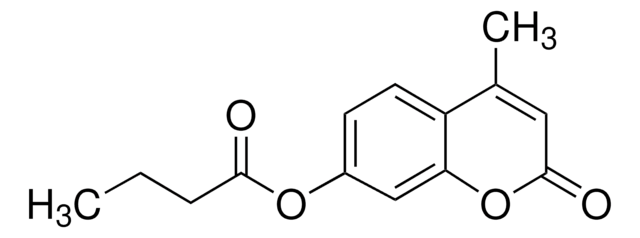M8168
4-Methylumbelliferyl phosphate disodium salt
phosphatase substrate, ≥98% (TLC), powder
Synonyme(s) :
4-MUP, Disodium 4-methylumbelliferyl phosphate
About This Item
Produits recommandés
product name
4-Methylumbelliferyl phosphate disodium salt, phosphatase substrate
Description
phosphatase substrate
Niveau de qualité
Pureté
≥98% (TLC)
Forme
powder
Solubilité
water: 50 mg/mL, clear, colorless
Fluorescence
λex 319 nm; λem 384 nm (pH 9.0)
λex 360 nm; λem 449 nm (Reaction product)
Température de stockage
−20°C
Chaîne SMILES
[Na+].[Na+].CC1=CC(=O)Oc2cc(OP([O-])([O-])=O)ccc12
InChI
1S/C10H9O6P.2Na/c1-6-4-10(11)15-9-5-7(2-3-8(6)9)16-17(12,13)14;;/h2-5H,1H3,(H2,12,13,14);;/q;2*+1/p-2
Clé InChI
WUUDJQVNZPEPKN-UHFFFAOYSA-L
Vous recherchez des produits similaires ? Visite Guide de comparaison des produits
Catégories apparentées
Substrats
Code de la classe de stockage
11 - Combustible Solids
Classe de danger pour l'eau (WGK)
WGK 3
Point d'éclair (°F)
Not applicable
Point d'éclair (°C)
Not applicable
Équipement de protection individuelle
Eyeshields, Gloves, type N95 (US)
Certificats d'analyse (COA)
Recherchez un Certificats d'analyse (COA) en saisissant le numéro de lot du produit. Les numéros de lot figurent sur l'étiquette du produit après les mots "Lot" ou "Batch".
Déjà en possession de ce produit ?
Retrouvez la documentation relative aux produits que vous avez récemment achetés dans la Bibliothèque de documents.
Les clients ont également consulté
Notre équipe de scientifiques dispose d'une expérience dans tous les secteurs de la recherche, notamment en sciences de la vie, science des matériaux, synthèse chimique, chromatographie, analyse et dans de nombreux autres domaines..
Contacter notre Service technique











